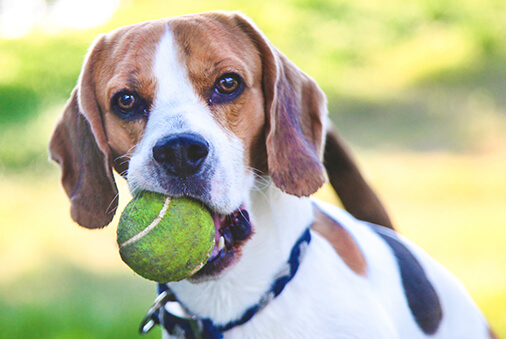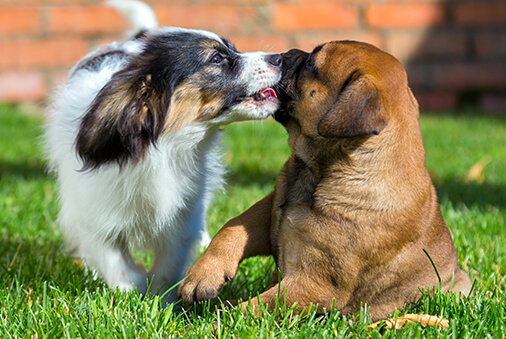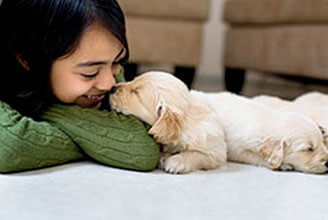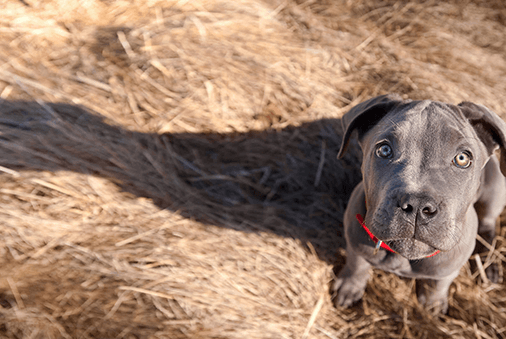What is the difference between puppy and adult dog food?
Puppy food is specifically formulated for the developmental needs of growing dogs, which is why it has elevated protein levels and calorie counts that are essential during the puppy stage. It’s commonly called “growth food” because it has balanced mineral levels for healthy bone growth.
As your pup approaches full size and adult weight, their nutritional needs evolve. This is usually a good time to transition to adult dog food. Spaying or neutering typically occurs at this age as well, reducing your dog’s metabolism and lowering their need for increased energy, hence a reason to switch from puppy to adult dog food.
How much food should I give my puppy?
The amount of food to give your puppy depends on various factors such as their age, breed, weight, activity level, and the specific type of food you are feeding. It’s crucial to follow the feeding guidelines provided on dog food packaging. Our Blue Buffalo puppy foods have a recommended feeding chart for puppies of different weights and ages.
No more than three meals a day
Growing pups who have a higher metabolism and energy needs usually eat three times a day. Younger puppies (especially small breeds) between four and six months old, should eat three to four times a day. Once they’re six months, you can move to two times a day or stick with three times if that’s an easier routine.
When you switch your dog to adult food, you’re not only cutting back on protein-dense, calorie-rich food, you’re cutting down on the number of meals. Most pet parents feed two meals a day (each meal equals half of the daily recommended calories) of adult food when their dogs are over a year old.
Monitor your dog’s weight, not his food
When gauging portions, watch your dog’s body, not his bowl. Food that’s vanished without a trace or left behind doesn’t necessarily mean your dog isn’t getting enough calories or nutrients. The higher calories in puppy food may make him feel full with less of a need to eat. Your dog’s nutritional needs are determined by his individual metabolism and body type, not a predesignated amount of adult food.
Keeping track of your dog’s weight can be an important indicator when it comes to portion size. You can weigh them at your veterinarian office — many offer this free of charge. If you’d prefer to stay home and have a scale, weigh yourself while holding your dog, then weigh yourself alone and subtract the two to calculate your dog’s weight.
If you’re concerned about your dog’s size or weight gain and you’ve already switched to an adult formula, it could mean your dog just needs fewer servings per day or less food at each meal.
How long do dogs eat puppy food?
Breed size matters
Switching to adult food coincides with maturity, but due to the large variety of breeds, different dogs mature at different rates. Smaller breeds tend to mature faster than larger breeds:
|
Breed Size |
Weight |
Recommended time to switch to adult food |
|
Small Breeds |
4-20 pounds |
6-9 months |
|
Medium Breeds |
20-50 pounds |
12-16 months |
|
Large Breeds |
50-80 pounds |
18-24 months |
|
Giant Breeds |
80+ pounds |
24 months |
Your veterinarian can recommend the best time to start feeding adult food based on your dog’s specific needs. Since obesity is the most common nutrition-based issue for canines and it can cause orthopedic problems in older dogs, it’s crucial adult dogs no longer eat puppy food. Instead, serve your best pal high-quality food formulated for adult maintenance.
Switch slowly from puppy to adult food
The recipe for successful food transitioning is to do it gradually. Mix a small amount of the adult food with your dog’s favorite puppy formula and slowly increase the amount over 10-14 days, while decreasing the puppy food.
By then, you should only be feeding your dog adult food. Changing his food gradually makes it less likely he’ll experience any gastrointestinal issues.






